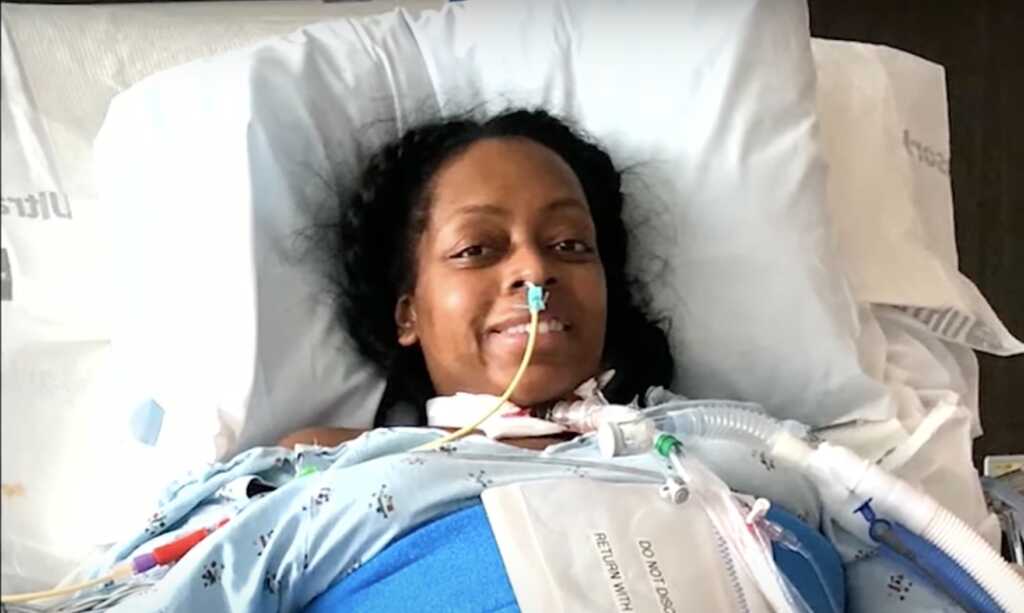After spending 136 days in the hospital, Sheenah Berry is finally home with her newborn daughter.
Berry, 37, spent four and a half months in the hospital, beginning in late August, when she believes she contracted COVID-19 from her 8-year-old son K.J., according to WAGA-TV.
Looking back — now holding her newborn daughter, Kensley — Berry is describing the chaotic and harrowing weeks behind her as “surreal.”
Just a week after contracting COVID-19, Berry, who was four months pregnant at the time, said she began struggling to breathe. On Sept. 2, she was admitted to Piedmont Henry Hospital before ultimately being transferred to Piedmont Atlanta, where she stayed until this past Saturday.
Berry was placed on a ventilator just hours after she arrived at the hospital.
While Berry doesn’t remember much of her health ordeal, her sister, Wandalyn McKinney, is reminding her of all that has happened over the past few months.
“She was able to call our mom and let her know that she was going to be placed on a ventilator,” McKinney told the local news outlet. “So they kind of did a FaceTime with each other, and she told our mom, ‘I have to go,’ and that was the last conversation we had with her for almost a month.”
Listen to today’s podcast and subscribe:
When she was transferred to Piedmont Atlanta, Dr. Peter Barrett said Berry was placed on an ECMO machine. “ECMO” stands for extracorporeal membrane oxygenation. The system, similar to the heart-lung bypass machine used during open-heart surgery, “pumps and oxygenates a patient’s blood outside the body, allowing the heart and lungs to rest,” according to UCSF Health.
Piedmont Atlanta has placed around 114 patients on ECMO machines since the start of the COVID-19 pandemic, including roughly 15 expectant mothers who were critically ill as a result of the virus.
All but one have lived. All of the babies, though, have survived, according to Barrett, who leads the hospital’s ECMO program.
“If you keep certain parameters, the baby can continue to grow and develop in a healthy manner,” the doctor explained. “We supported two individuals, the mom and the baby, and it is a technology that is effective.”
Nevertheless, it was still a difficult undertaking — and the outcome was far from clear. Barrett said Piedmont Atlanta had never cared for, or used an ECMO machine, on an expectant mother that early in her pregnancy.
Berry spent nearly two months in a medically induced coma and her vitals were constantly changing. Because of the pandemic, Berry spent most of her treatment alone in the hospital, with medical staff giving her family members updates three to four times a day.
McKinney said the situation was “life-altering” for her sister and her family.
“We prayed over them constantly,” she recalled. “And my mom, she said, she just knew they were going to be OK.”
And she was right.
Through a C-section, Berry delivered her baby Saturday.
“It was like witnessing a miracle with your own eyes,” McKinney said of the birth, which came at 37 weeks. “That my sister was able to fight and survive through this, and then now she’s bringing her daughter, a child, into the world. It was just absolutely magical.”
Berry, for her part, immediately credited God when she saw her newborn child.
“It was, like, ‘OK, we did it. We made it. Thank you, God,'” she said. “And, I just want all the pregnant moms to know they need to get vaccinated, because that can help.”
Berry is still on oxygen but both she and Kensley are at home and recovering well.
***As the number of voices facing big-tech censorship continues to grow, please sign up for Faithwire’s daily newsletter and download the CBN News app, developed by our parent company, to stay up-to-date with the latest news from a distinctly Christian perspective.***



